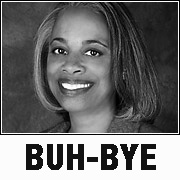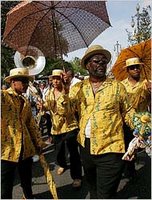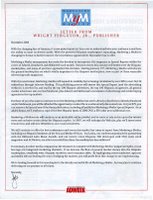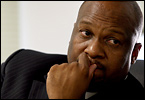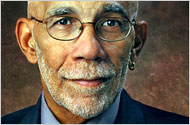
One of the many phrases made popular by the Rev. Jesse Jackson is, “I am somebody!” For Madison Avenue honchos, it may ultimately be revised to read, “I am somebody who will make your lives a living hell!”
Advertising Age headlined, “Jesse Jackson Enters Ad Industry Diversity Fray” (see Essay 1326). At the 2006 ANA Multicultural Marketing Conference in Los Angeles, Jackson announced plans for nationwide public hearings and a “major workshop on advertising.”
Jackson declared, “There is no shortage of talent. … Don’t put the [Latino] and the Black agency under your roof. Empower them to grow. McCann Erickson is not Burrell. Foote — whatever it is you call that company — is not Uniworld. Empower them to be a force at the table, don’t co-opt them by saying here’s a buyout.”
The original goal of pro-diversity activists entailed simply getting agencies to employ more minorities. But Jackson took things further by recommending the industry abolish the ghetto status of multicultural shops too. Now there’s progressive thinking that’s downright radical.
Not sure why Jackson finally decided to officially speak out. Insiders claim the man has repeatedly offered his influence, but multicultural advertising figures asked him to back off to avoid upsetting client-agency relationships.
Online responses included the typical outrage that Jackson usually sparks (see Essays 1345, 1341, 1337 and 1332). One person typed, “Isn’t Jesse supposed to be a minister? What gives him the right to butt in on every industry’s existence (Coca-Cola, for example)? … He drives me crazy.”
Another complainer sniffed, “Well, Jackson’s involvement confirms that this entire issue is just a circus for the politicos and the press. Jackson is nothing if not a divider of the races (it is how he makes his living!). He has no industry qualifications or expertise that would qualify him to be involved in this imaginary ‘problem.’”
It’s safe to guess Jackson doesn’t fret over such attacks. Hell, he’s probably more worried about finding words that rhyme with advertising.
Besides, the short-fused critics are short on the facts.
The Rev. Jesse Jackson just celebrated his 65th birthday and 40 years of Civil Rights-related service.
A recent Jackson interview revealed, “I was born during the Second World War under legal apartheid, in racially segregated Greenville, South Carolina. … It was illegal for Black people to make the same amount of money as White people. A second-class education for Blacks was the law. You couldn’t apply to the state universities.
“My father was a veteran of World War II, came back home, and couldn’t vote. I was born under conditions where we were not second-class people, but had second-class positions as a matter of law, a kind of state terrorism.”
In 1960, college freshman Jesse Jackson was arrested with seven other students for attempting to access the White-dominated public library in Greenville. “They called us ignorant, but arrested us for trying to use the library,” said Jackson. “That was my most daring act to that point.”
Jackson has always worked for voting rights, participating in the Selma to Montgomery marches in 1965. He later joined the historic movement led by Dr. Martin Luther King Jr.
As national director of Operation Breadbasket, Jackson created business breakthroughs. “Breadbasket was a great highlight because we opened all kinds of closed doors to businesses,” said Jackson. “Putting Black products on shelves: Joe Louis Milk, Johnson Publishing Company magazines, Parker House Sausage. The barriers started collapsing. Ads in Black newspapers — we got [Illinois] state treasurer Adlai Stevenson to make an adjustment in the law to put money in Black banks. What we did at Breadbasket became a method and model for all of urban America.” Hey, Jackson deserves the label of marketing and promotional guru.
Jackson was present at Dr. King’s assassination. “A traumatic moment — it was a world-changing moment for the entire Civil Rights struggle at that stage,” remembered Jackson. “But we were determined not to let one bullet kill the whole movement, so we didn’t stop.”
Jackson ran for President of the United States in 1984 and 1988. His 1988 Democratic National Convention Address introduced the proclamation, “Keep hope alive!” Have any advertising copywriters ever produced a better tagline?
Through the years, Jackson has masterminded numerous protests and boycotts seeking fairness, equality and justice. In 1984, he negotiated the release of a Navy flier being held prisoner in Syria. From Wall Street to Sesame Street, Jackson’s consistently made positive impacts. Plus, the man leads an organization where “we have met every Saturday since 1966 — for 40 years — educating, inspiring, directing, and becoming a frame of reference for our struggle, and there’s a whole generation of people who have benefited.”
Like it or not, Jesse Jackson brings a high-level, powerful presence to the advertising industry’s diversity dilemma. Don’t be surprised if Jackson rouses public and client support as well. His personal background shows he’s uniquely skilled at battling all forms of discrimination. Given this icon’s credentials and résumé, you’d be hard-pressed to find anyone in the business more qualified to play in the continuing proceedings.
Yes, it’s unfortunate that the industry has failed to police itself. Additionally, it’s too bad insiders can’t affect change without risking career suicide. But the haters can quit ranting, raving and whining. Jesse Jackson is on the scene, and he’s not going away anytime soon.
In closing, let’s recognize that Jackson’s most famous targets in the advertising industry — Coca-Cola and Toyota — appear to be prospering quite nicely since his interventions. There’s no reason to believe the ad biz won’t flourish likewise.
Keep hope alive!
[MultiCultClassics note: Much of the biographical information in this essay was acquired from a story by David Smallwood, whose work was published by “N’Digo: A Magapaper For The Urbane.” Click on the essay title above to read the full story.]







